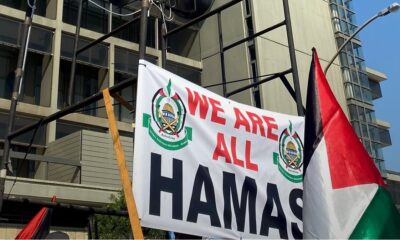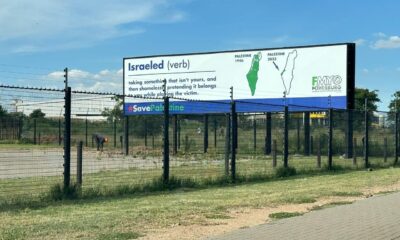
Banner

SA film association calls for Israel ‘blackout’
The Documentary Filmmakers Association (DFA) of South Africa is calling for all media film and cultural institutions to cut all ties with Israel. This organisation, ostensibly there to assist, protect, and promote filmmakers, has called for a “cultural, diplomatic, and economic” boycott.
The DFA put out a press statement on 18 November stating that “documentary filmmakers have a duty to bear witness and cannot ignore the suffering displayed on screens around the world”, ignoring the fact that Israeli filmmakers could be telling stories that do just that.
Even if Israeli documentary filmmakers criticise their government, highlight the plight of Palestinians, document the horrors of 7 October, or record testimonies of hostages, the DFA wants them boycotted.
The director of the Free Speech Union of South Africa, Sara Gon, says, “The DFA’s statement is troubling because it appears to negate its very purpose. As it appears to service the interests of an industry, it seems that its support is confined to a narrative that is largely false and defamatory. While documentaries invariably have a certain slant, the DFA’s failure to at least research the other side of the conflict and weigh up the respective evidence is lamentable.”
Though the DFA’s statement acknowledges that “more than 1 700 Israelis, including more than 900 civilians, have lost their lives [since 7 October 2023]”, it demands that these stories be silenced by the cutting of ties. The statement calls for the “protection of storytellers”, but makes it clear that this doesn’t include Israeli storytellers.
The organisation said it stood in solidarity with the call for “an immediate ceasefire, and the release of all hostages and prisoners”. It also expressed support for South Africa’s “genocide” case at the International Court of Justice, and said Israel’s “violations of international law bear similarities to, or exceed, the racial segregation of apartheid”.
It maintained that it was guided by its responsibility to “support oppressed and marginalised people across Africa and beyond.
“As part of a global community of media professionals, we understand that any attack on journalists reverberates across our industry,” the statement read, oblivious to the fact that the DFA’s call for a boycott is an attack on Israeli journalists.
The statement notes that the “systematic shutdown of media outlets, restrictions on independent access to conflict zones, and violence against our colleagues set a dangerous precedent for media workers everywhere”. Yet, somehow, the organisation neglects to see that by boycotting Israeli documentary filmmakers, it’s doing the same to them.
“Together, we must protect freedom of expression [and] foster critical dialogue,” continues the statement, while at the same time calling for the curtailment of freedom of expression of Israeli creatives who could foster critical dialogue.
The DFA describes Israel’s self-defensive war against Hamas as “war crimes, genocidal actions, ongoing atrocities [and] a humanitarian crisis”, and Israel’s existence as “Israeli apartheid and colonial occupation”.
It demands urgent “international intervention to protect journalists and filmmakers”, specifically regarding the “risks faced by Palestinian and pro-Palestinian voices”.
Says Gon, “There has been a plethora of information about the war from the Israeli side, refuting much of what the DFA relies on in its statement.
“How would the DFA square the evidence it relies upon with the many documentaries featuring victims of the 7 October atrocities?” she asks. “Have they watched any of them? If so, do they dismiss the veracity of that evidence? If so, on what basis?
“It appears that by virtue of referring to themselves as ‘progressive’, it means that the organisation wouldn’t be a resource for documentary makers whose stance differs to its singular and uncritical view of one side while having no regard whatsoever for the other,” she says. “If this is the case, then it cannot pretend to represent the interests of documentary filmmakers as an industry. Surely, the search for truth requires being openminded about views across the spectrum? If not, then it serves no purpose.”
Analyst Adam Charnas says, “This statement is yet another example of political grandstanding by organisations seeking to gain relevance by attaching to a ‘cause célèbre’. While we all mourn every loss of life in this horrific conflict, meaningless gestures such as these do absolutely nothing to ease the suffering of the people of Gaza. It’s laughable that an organisation that represents journalistic integrity would do so little to balance a statement that doesn’t mention the violence and rape perpetrated on 7 October.”
South African Zionist Federation spokesperson Rolene Marks says the world needs to bear witness to the atrocities committed on 7 October, and Israeli documentary films are one way to do this. “It’s a great pity that scenes of terrified Israelis running for their lives from the Nova festival as nearly 400 were slaughtered, kidnapped, and raped aren’t shown to the wider public,” she says.
“Then there’s the footage of the 7 October massacre, which Hamas gleefully filmed in real time as it provoked a war with Israel,” says Marks. “In the interest of balance and not sowing hate and division, we appeal to the DFA that such documented scenes aren’t boycotted, but shared with a public that needs to know.”
Professor Anton Harber, the director of nongovernmental organisation the Campaign for Freedom of Expression, says, “Anyone is entitled to call for boycotts, especially given Israel’s growing clampdown on free speech and the death of dozens of journalists. However, we should be speaking out against all attacks on all citizens, and all those who restrict media.
“I’m concerned about a blanket call against all Israelis, including those who are critical of the Netanyahu government,” says Harber. “We learnt in apartheid South Africa that what’s most effective is targeted, select boycotts that offer encouragement to those who are calling for peace and a political solution.”
The SA Jewish Report reached out to the DFA for comment, but didn’t receive a response by the time of going to print.










